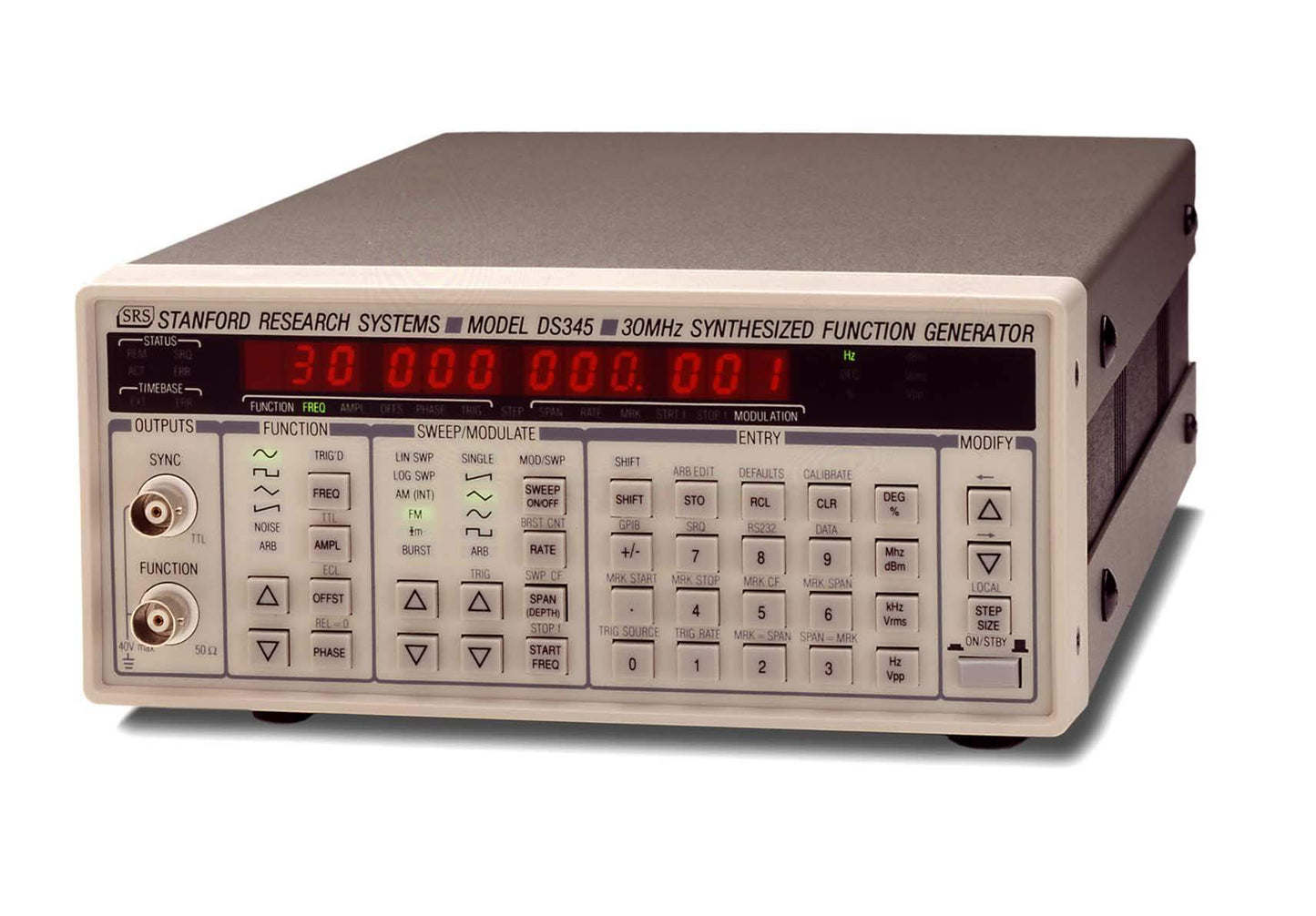

The DS345 is a full-featured 30 MHz synthesized function generator that uses an innovative Direct Digital Synthesis (DDS) architecture. It generates many standard waveforms with excellent frequency resolution (1 µHz), and has versatile modulation capabilities including AM, FM, Burst, PM and frequency sweeps. It also generates arbitrary waveforms with a fast 40 Msample/s update rate.
The unit generates sine waves and square waves at frequencies up to 30.2 MHz, and triangle and ramp waveforms up to 100 kHz. The frequency resolution for all functions is 1 µHz. In addition to the standard waveforms, the unit also provides a wideband (10 MHz) white noise source.
Both the function output and a TTL SYNC output are available through floating, front-panel BNC connectors. Both outputs have 50 Ω output impedances and may be floated up to ±40 V relative to earth ground. The amplitude of all function outputs is adjustable from 10 mVpp to 10 Vpp with 3-digit resolution and can be displayed in Vp, Vpp, Vrms or dBm. In addition, standard TTL and ECL output levels can be selected.
Additional useful connectors are provided on the rear panel. A trigger input is used to trigger arbitrary waveforms, modulation patterns, sweeps, and bursts, while a TTL trigger output is provided to allow synchronization of external devices to sweeps and bursts. A sweep output generates a 0 to 10 V ramp synchronous with frequency sweeps. The sweep marker outputs allow specified portions of a frequency sweep to be highlighted on an oscilloscope.
A 10 MHz rear-panel input allows the DS345 to be synchronized to an external timebase. A 10 MHz rear-panel output allows multiple DS345s to be phase locked together.
Modulation
The arbitrary function generator offers a wide variety of modulation options. It contains an internal modulation generator which can modulate any of its standard waveforms except noise. The modulation waveform can be a sine, square, triangle, ramp, or an arbitrary waveform. Modulation rates from 1 MHz to 10 kHz can be selected.
The modulation generator can provide amplitude modulation (AM), frequency modulation (FM), and phase modulation (PM). When using AM, modulation depths of ±100 % can be selected with 1 % resolution. Negative values of modulation correspond to Double Sideband Suppressed Carrier (DSBSC) modulation. FM spans can be selected with 1 µHz resolution, and phase modulation can be set between 0° and 7200° with 0.001° resolution.
In addition to the internal modulation generator, the output waveform can be amplitude modulated by an external signal applied to the rear-panel AM input. This input is always active even when other modulation types are turned on.
You can generate tone bursts of any output function except noise. In the burst mode, the DS345 will output an exact number of complete waveform cycles after receiving a trigger. By adjusting the phase, you can control where in the waveform the burst begins. While using the burst mode, the maximum frequency for sine waves and square waves is 1 MHz, while triangles and ramps are limited to 100 kHz. Burst mode may be used with arbitrary waveforms at any frequency.
Frequency Sweeps
The unit can frequency sweep any of its function outputs (except noise). You can sweep up or down in frequency using linear or log sweeps. Unlike conventional function generators, there are no annoying discontinuities or band-switching artifacts when sweeping through certain frequencies. The unit's DDS architecture inherently allows it to perform smooth, phase-continuous sweeps over its entire frequency range.
Two sweep marker frequencies can be specified. When the sweep crosses either of the marker frequencies, a TTL transition is generated at the rear-panel MARKER output to allow synchronization of external devices.
Arbitrary Waveform Capability
The generator isn't just a function generator. It's also a full-featured arbitrary waveform generator. Output waveforms have 12-bit vertical resolution and can be played back at rates up to 40 Msamples/s.
Since composing complex arbitrary waveforms at the keyboard can be a tedious task, Arbitrary Waveform Composer (AWC) software is provided at no charge. AWC is a menu-based program which lets you create and edit arbitrary waveforms on the screen, store them, and download them to the DS345.
Model No
DS345
Condition
Used
Manufacturer
Stanford Research
Frequency
30 MHz
1
GPIB , RS-232 and arb. software
2
10 ppb OCXO timebase
Hey👋Let's start with your email